| Article ID | Journal | Published Year | Pages | File Type |
|---|---|---|---|---|
| 2652752 | International Journal of Nursing Sciences | 2016 | 6 Pages |
PurposeTo explore how perceptions of self-efficacy, health locus of control and outcome expectancy impact the adherence of adults with type 2 diabetes mellitus in Saudi Arabiato self-care activities.MethodsA descriptive correlation design was used to analyse self-report questionnaires completed by a convenience sample of Arabic-speaking individuals (n = 30) with type 2 diabetes mellitus from King Abdulaziz Medical City in Riyadh.ResultsMore than half (53%) of participants reported high self-efficacy, and the majority (77%) valued health and believed that effective diabetes management was important. Although the vast majority (93%) of participants believed that their doctor influenced their diabetes management, 90% and 80% also acknowledged themselves and God, respectively, as the health locus of control. Participants who perceived that they or their doctors were in control of their health condition were more likely to adhere to self-care activities, such as follow a specific diet and perform foot care (p < 0.05). Furthermore, female participants reported significantly greater adherence to medication than male participants (6.91 ± 0.29 vs 5.14 ± 2.44; p = 0.02), and unmarried participants reported greater adherence to exercise than married participants (4.15 ± 2.22 vs 1.60 ± 1.43; p = 0.001). Finally, self-efficacy had a significant, positive correlation with participants' adherence to exercise (r = 0.491; p = 0.006) and performing their foot care (r = 0.586; p = 0.001).ConclusionPatients' perceptions of their health should be considered by healthcare providers to maximize adherence to effective self-care management.
